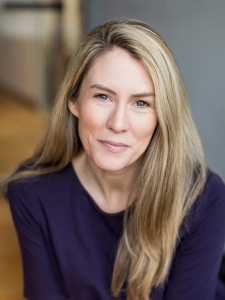
Photo by Jennifer Korman
Following the 2014 shooting death of Michael Brown in Ferguson, Mo., Adelaide Lancaster ’02 began seeking out fellow white parents who would share her interest in facilitating family discussions about race. A year later, she opened registration for her new St. Louis–area nonprofit called We Stories, which uses multicultural children’s books as a springboard for those conversations.
Lancaster wondered if she would have many, if any, participants. “Our community was blanketed in silence,” she says. “I didn’t have any sense [that people were] longing for something different.” But, within the first 48 hours, 80 families with 120 children signed up. “It was exhilarating,” says Lancaster, who co-founded We Stories with Laura Horwitz.
“It taught me a valuable lesson that it is impossible to interpret silence,” Lancaster says. “People often assume it means disinterest or opposition. Some people have been conditioned to be silent around the issue of race. But silence also can mean, ‘I’m stuck and I don’t know what to do.’ Until we actively invite people to participate and give them opportunities that make sense to them, we can’t count them out.”
Over the past four years, 930 families representing more than 100 ZIP codes have accepted the invitation to join We Stories’ 12-week Family Learning Program. It provides families with resources to drive their conversations, connections to like-minded families, and opportunities to add their voices to racial justice pursuits so that they will become a force of positive change.
We Stories’ tagline is “Raising Big-Hearted Kids.” So far, more than 1,500 children, from birth to 8 years old, have participated in the Family Learning Program, and thousands more have participated through the organization’s partnerships with regional schools and libraries.
Lancaster wasn’t much older than them when her third-grade teacher sparked her interest in racial equality. “Mrs. Hamilton was the only black teacher at my predominantly white private school, and she was ahead of her time in her diversity efforts,” Lancaster says. “I had the opportunity early on to be part of conversations that were explicitly about race, particularly in settings with a great amount of privilege.”
When the Ferguson shooting happened, Lancaster — a fairly recent transplant to St. Louis — found herself revisiting those conversations. “I always considered myself to be someone who cared about antiracism work,” Lancaster says. “But, to be honest, there was no way to tell me apart from any of my neighbors on my all-white block. I had a 4-year-old daughter whom I had never talked about race with. I took that time to challenge myself to show up differently, as a member of our civic community but also as a parent.”
When protests erupted in St. Louis in September 2017 over the acquittal of white police officer Jason Stockley in the fatal shooting of Anthony Lamar Smith, a black man, Lancaster and fellow We Stories families were prepared to show up. Some protested for the first time in their lives. Others wove the protests into the ever-richer conversations they were having at home with their children and beyond — conversations that continue to this day.
“These shifts in how we think about race, and what that means in terms of our responsibility past and present, happen on a daily, bedtime-story-by-bedtime-story basis,” Lancaster says. “Once we give our children this knowledge, they are the ones who hold us accountable.”
